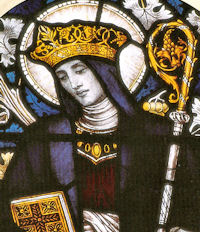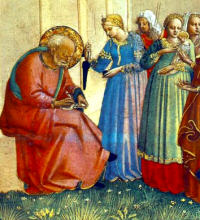Ordinary Time: June 23rd
Saturday of the Eleventh Week of Ordinary Time
Other Commemorations: St. Ethelreda, Virgin (RM); Vigil of the Nativity of St. John the Baptist ; Other Titles: Johannisnacht; St. John's Eve; Midsummer's Eve
» Enjoy our Liturgical Seasons series of e-books!
According to the 1962 Missal of St. John XXIII the Extraordinary Form of the Roman Rite, today is the Vigil of St. John the Baptist. The Birth of St. John the Baptist is a solemnity, and so observance still begins with Evening Prayer I in the Liturgy of the Hours of the preceding day. The liturgical day is from midnight to midnight in the Church's observance, except for Sunday and solemnities which begin with the evening of the preceding day.
Historically today is also the feast of St. Ethelreda the most popular of Anglo-Saxon women saints. She lived in the early era of the Germanic invasion of Britain.
There was a man sent from God whose name was John
Whom, my brethren, can we conceive to have such majestic and severe sanctity as the Holy Baptist? He had a privilege which reached near upon the prerogative of the Most Blessed Mother of God; for, if she was conceived without sin, at least without sin he was born. She was all-pure, all-holy, and sin had no part in her: but St. John was in the beginning of his existence a partaker of Adam's curse: he lay under God's wrath, deprived of that grace which Adam had received, and which is the life and strength of human nature. Yet as soon as Christ, his Lord and Savior, came to him, and Mary saluted his own mother, Elizabeth, forthwith the grace of God was given to him, and the original guilt was wiped away from his soul. And therefore it is that we celebrate the nativity of St. John; nothing unholy does the Church celebrate; not St. Peter's nor St. Paul's, nor St. Augustine's, nor St. Gregory's, nor St. Bernard's, nor St. Aloysius's, nor the nativity of any other Saint, however glorious, because they were all born in sin. She celebrates their conversions, their prerogatives, their martyrdoms, their deaths, their translations, but not their birth, because in no case was it holy.
Three nativities alone does she commemorate, our Lord's, His Mother's, and lastly, St. John's. What a special gift was this, my brethren, separating the Baptist off, and distinguishing him from all prophets and preachers, who ever lived, however holy, except perhaps the prophet Jeremiah. And such as was his commencement, was the course of his life. He was carried away by the Spirit into the desert, and there he lived on the simplest fare, in the rudest clothing, in the caves of wild beasts, apart from men, for thirty years, leading a life of mortification and of meditation, till he was called to preach penance, to proclaim the Christ, and to baptize Him; and then having done his work, and having left no act of sin on record, he was laid aside as an instrument which had lost its use, and languished in prison, till he was suddenly cut off by the sword of the executioner. Sanctity is the one idea of him impressed upon us from first to last; a most marvelous Saint, a hermit from his childhood, then a preacher to a fallen people, and then a Martyr. Surely such a life fulfills the expectation, which the salutation of Mary raised concerning him before his birth.
—John Henry Newman
Catechism of the Catholic Church, 719: John the Baptist is "more than a prophet" (Lk 7:26). In him, the Holy Spirit concludes his speaking through the prophets. John completes the cycle of prophets begun by Elijah (Cf. Mt 11:13-14). He proclaims the imminence of the consolation of Israel; he is the "voice" of the Consoler who is coming (Jn 1:23; cf. Isa 40:1-3). As the Spirit of truth will also do, John "came to bear witness to the light" (Jn 1:7; cf. Jn 15:26; 5:35). In John's sight, the Spirit thus brings to completion the careful search of the prophets and fulfills the longing of the angels (Cf. I Pet 1:10-12). "He on whom you see the Spirit descend and remain, this is he who baptizes with the Holy Spirit. And I have seen and have borne witness that this is the Son of God.... Behold, the Lamb of God" (Jn 1:33-36).
Highlights and Things to Do:
- St. John's Birth marks the summer solstice. On the eve of this feast many countries have celebrated with bonfires. This is especially true in Ireland, Estonia, Latvia, and Lithuania. See the list of suggested activities to read more about this tradition.
- Read about St. John's Eve/Midsummer's Eve particularly in Ireland (note the link is a secular website). See also The Farmer's Almanac for more information.
- From the Germanic countries, here is some information on the Summer Solstice.
- Father Francis Weiser, S.J. has several descriptions of the customs attached to St. John's Eve: The Holyday Book and Handbook of Christian Feasts and Customs.
St. Ethelreda
 St. Etheldreda, commonly known as Audry, was Queen of Northumbria. She was born at around 630, and while still very young she was given in marriage by her father, Anna, King of East Anglia, to a subordinate prince, who gave her a piece of land locally known as the Isle of Ely. She remained a virgin even during her marriage, and five years after his early death, lived in isolation.
St. Etheldreda, commonly known as Audry, was Queen of Northumbria. She was born at around 630, and while still very young she was given in marriage by her father, Anna, King of East Anglia, to a subordinate prince, who gave her a piece of land locally known as the Isle of Ely. She remained a virgin even during her marriage, and five years after his early death, lived in isolation.
St. Etheldreda was forced to marry again out political convenience, this time to the heir of Oswy, King of Northumbria. Throughout her 12 years of marriage, she kept her virginity, and she gave much of her time to devotion and charity.
St. Wilfrid was her friend and spiritual guide, and helped to persuade her husband that St. Etheldreda should live for some time in peace as a sister of the Coldingham nunnery, founded by her aunt, St. Ebb.
During this time, St. Etheldreda only ate once a day, except on feast days or while she was sick, and wore only clothes made of wool. After midnight prayers, she would always go back to the church and continue praying until morning.
St. Etheldreda took pain and humiliation as a blessing—on her death bed, she thanked God for an illness that had painfully swollen her neck, which she considered to be punishment for having vainly worn necklaces with jewels as a young lady.
She died on June 23, 679, and was buried in a wooden coffin, as she had asked.
When St. Etheldreda’s body was moved to a stone coffin, it was found incorrupt and her neck was perfectly healed, according to physicians.
—Excerpted from CNA
Symbols and Representation: abbess holding a model of Ely Cathedral; abbess with a crown holding a budding staff
Patronage: neck ailments; throat ailments; University of Cambridge; widows
Highlights and Things to Do:
- Read more about St. Ethelreda:
- Read St. Bede's account of St. Ethelreda.
- St. Ethelreda is also known as St. Audrey. The term "tawdry" has origins from a medieval fair held in Ely in honor of St. Audrey. See more from St. Audrey.
- St. Ethelreda's body was formerly in Ely Cathedral. Her body was incorrupt. But during the English Reformation Ely’s monastery was closed in 1539, and Etheldreda’s shrine was destroyed. Some of St. Ethelreda's relics are at St Etheldreda's Church, Ely Place, London, including her hand, which was discovered in a recusant hiding place near Arundel in 1811.






